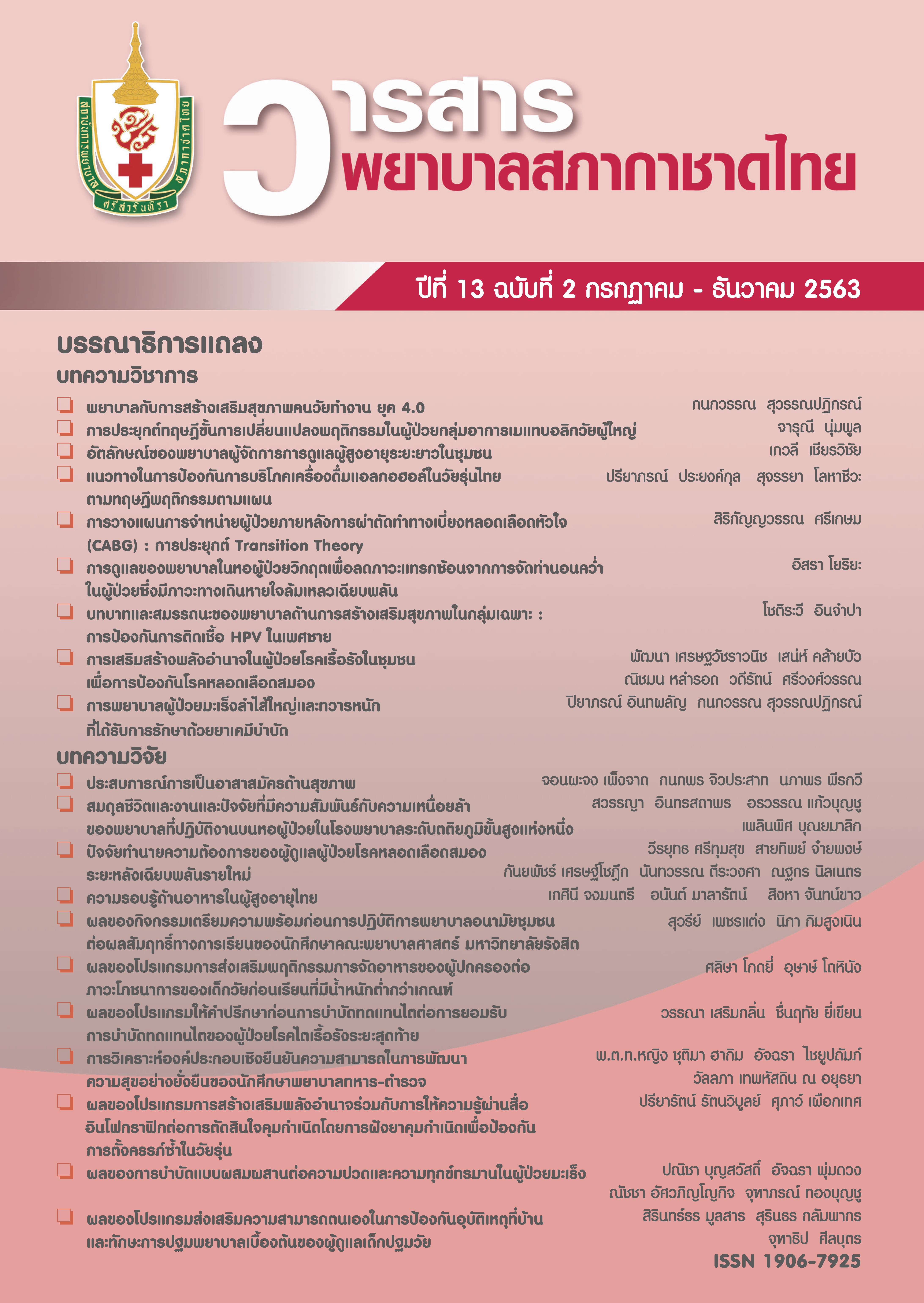Applications of the Transtheoretical Model in Adult Patients with Metabolic Syndrome
Keywords:
metabolic syndrome, transtheoretical model, adultAbstract
Metabolic syndrome (MS) is the most common health problem in adults with obesity or abdominal obesity with high blood pressure, high blood sugar, and/or dyslipidemia including elevated triglycerides and a low level of HDL cholesterol. The main cause of MS is an unhealthy lifestyle. Metabolic syndrome is a risk factor for cardiovascular disease. It is necessary to have both medication and non-drug treatments. Lifestyle modifications is the non-drug treatment. The Transtheoretical Model can be applied for use in behavioral changes to help people overcome obstacles in behavioral changes toward having new healthier behaviors resulting in a better recovery of MS. This article describes the concept of the Transtheoretical Model and applications in promoting healthier behaviors in patients with MS.
References
2. Ranasinghe P, Mathangasinghe Y, Jayawardena R, Hills AP, Misra A. Prevalence and trends of metabolic syndrome among adults in the Asia-Pacific region: a systematic review. BMC Publ Health 2017;17:101. doi: 10.1186/s12889-017-4041-1.
3. Al-Qawasmeh RH, Tayyem RF. Dietary and lifestyle risk factors and metabolic syndrome: literature review. Curr Res Nutr Food Sci 2018;6(3):594-608. doi: 10.12944/CRNFSJ.6.3.03.
4. Walker J. Payne S, Jarrett N, Ley T. Psychology for nurses and caring professions, 4th ed. Berkshire: Open University Press; 2012.
5. Chonpracha S. Adult learning theory: what teachers teach adults to learn. Edupsu 2014; 25(2):13-23. (in Thai)
6. Aekplakorn W. Health status. In: Aekplakorn W, editor. Report of the 5th Thai national health examination survey 2014. Nonthaburi: Alphabet & graphic design; 2016. p.133-196. (in Thai)
7. Stasser B. Physical activity in obesity and metabolic syndrome. Ann N Y Acad Sci 2013;1281(1):141–59. doi: 10.1111/j.1749-6632.2012.06785.x
8. Vieira BA, Luft VC, Schmidt MI, Chambless LE, Chor D, Barreto SM, et al. Timing and type of alcohol consumption and the metabolic syndrome - ELSA-Brasil. PLoS One 2016;11(9): 1-17. doi:10.1371/journal.pone.0163044.
9. Bergmann N, Gyntelberg F, Faber J. The appraisal of chronic stress and the development of the metabolic syndrome: a systematic review of prospective cohort studies. Endocr Connect 2014;3(2):R55 – R80. doi: 10.1530/EC-14-0031.
10. Yamaoka K, Tango T. Effects of lifestyle modification on metabolic syndrome: a systematic review and meta-analysis. BMC Med 2012;10:138. doi: 10.1186/1741-7015-10-138.
11. Pease DJ. Metabolic syndrome. In: Buttaro TM, Polgar-Bailey P, Sandberg-Cook J, Trybulski J, editors. Primary care: interprofessional collaborative practice. 6th ed. Missouri: Elsevier; 2021. p.1172-7.
12. Panidchakul K, Samranbua A. An application of transtheoretical model to promote exercise. The Journal of Boromarajonani College of Nursing, Nakhonratchasima 2013;19(1):66-76. (in Thai)
13. Davis KM, Alpert PT, Clevesy M. Using the transtheoretical model of change to improve lifestyle behaviors in a woman with metabolic syndrome. J Dr Nurs Pract 2016;9(1):81-7. doi:10.1891/2380-9418.9.1.81.
14. Pantaewan P, Prasittivatechakod A. Application of transtheoretical model and smoking behavior modification. Journal of The Royal Thai Army Nurses 2014;15(1):36-44. (in Thai)
15. Zhu L-X, ChingHo S, HungSit JW, GuHe H. The effects of a transtheoretical model-based exercise stage-matched intervention on exercise behavior in patients with coronary heart disease: a randomized controlled trial. Patient Educ Couns 2014;95(3):384-92. doi:10.1016/j.pec.2014.03.013.
16. Kim CJ, Kim DJ, Park HR. Effects of a cardiovascular risk reduction intervention with psychobehavioral strategies for Korean adults with type 2 diabetes and metabolic syndrome. J Cardiovasc Nurs 2011;26(2):117-28. doi: 10.1097/JCN.0b013e3181ec02ae.
17. Mostafavi F, Ghofranipour F, Feizi A, Pirzadeh A. Improving physical activity and metabolic syndrome indicators in women: a transtheoretical model-based intervention. Int J Prev Med2015;6(28):1-8. doi: 10.4103/2008-7802.154382.
18.Yoo S, Kim H, Cho HI. Improvements in the metabolic syndrome and stages of change for lifestyle behaviors in korean older Adults. Osong Public Health Res Perspect 2012;3(2): 85–93. doi: 10.1016/j.phrp.2012.04.007.
19. Kim CJ, Kim BT, Chae SM. Application of the transtheoretical model: exercise behavior in korean adults with metabolic syndrome. J Cardiovasc Nurs 2010;25(4):323-31. doi:10.1097/JCN.0b013e3181c8a3e8.
20. Leecharoen P. Application of trantheoretical model to complication prevention in patients with chronic disease. NJPH 2013;23(3):1-9. (in Thai)
Downloads
Published
Issue
Section
License
เนื้อหาบทความหรือข้อคิดเห็นต่างๆ ในวารสารพยาบาลสภากาชาดไทยนี้ เป็นความคิดเห็นของผู้เขียนบทความ ไม่ใช่ความเห็นของกองบรรณาธิการ หรือสถาบันการพยาบาลศรีสวรินทิรา สภากาชาดไทย






